10 Fintech Startups From California Every Founder Should Know
Fintech market experts predict an annual growth rate of 25% until 2022. Which are the top Cali-based Fintech players to watch?
Małgorzata Galińska
Jul 22, 2021 | 10 min read
The financial services industry continues to attract startups that aim to transform how people and businesses spend, save, borrow, and invest money. Take a look at the 2020 CB Insights list of top 250 Fintech companies, and you’ll see that they raised $49.2 billion in aggregate funding across almost 900 deals made since 2015!
From digital banking and insurance to lending and wealth management, Fintech companies and budding startups are growing fast today. And, California is the origin of many successful ventures that have earned global fame.
Read on to find out more about the most impressive California-based Fintech companies.
What is Fintech?
Fintech is the name given to the cluster of Fintech companies that deliver innovative products and services, which compete with traditional means of delivering financial services. This emerging industry uses technology to improve these services and make them more accessible. The best example of Fintech is the use of smartphones for mobile banking, investing, and lending services.
When was Fintech first used?
The word “Fintech” appeared for the first time in the 1980s when Peter Knight - the editor of the Sunday Times business newsletter - used it to describe a bot that had changed his mailbox.
But how did Fintech as we know it emerge?
The Global Financial Crisis in 2008 increased public distrust of traditional financial institutions. This, in turn, led to a shift in mindset and opened the doors to a brand-new industry that we call Fintech today.
The release of Bitcoin v0.1 in 2009 and the boom of different cryptocurrencies impacted the financial world as well.
Another critical factor that led to the emergence of Fintech was the mass-market penetration of smartphones that brought internet access to millions of people across the world. These consumers were open to using mobile payments and mobile applications for carrying out financial operations, powering the rise of Fintech.
8 Fintech fun facts that will enrich your small talk

Most business meetings start with small talk, breaking the ice and building a deeper connection between the participants. If you’re planning a Fintech-related meeting, it’s worth having a few brilliant curiosities up your sleeves that will attract and surprise the room.
Check out my top 8 rich and tasty starters... Bon appetit!
-
In the first half of 2020, Fintech investment reached 1221 deals representing $26.5 billion globally! (KPMG, 2020)
-
Even 28% of banking and payment services are at risk of disruption because of the new business models introduced by Fintech. (PwC, 2020)
-
Companies that use Robotic Process Automation (RPA) for banking-related tasks see an ROI of 100% within 3 to 8 months. (Medium, 2020)
-
Stripe is the largest Fintech company in the United States, worth $22.5 billion. (Forbes, 2019)
-
AI is one of the leading technologies in the Fintech scene, boasting a market share of 38.25% in 2019. (Research and Markets, 2020)
-
PayPal is probably the biggest financial company in history - as well as one of the world's first Fintech companies.
-
The largest Fintech market in Central and Eastern Europe is Poland.
-
Fintech companies in Africa raised more capital than ever - the amount of funding grew to $1.35 billion last year from $1 billion in 2019. (Bloomberg)
Ok, now that we’re done with small talk, let’s get into the core part about Fintech companies.
We picked these 10 startups and tech companies based in San Francisco, Los Angeles, Palo Alto, and other locations in California because of their incredible success, high valuation, market share, and drive to innovate.
10 top Fintech companies based in California you should know
1. Stripe
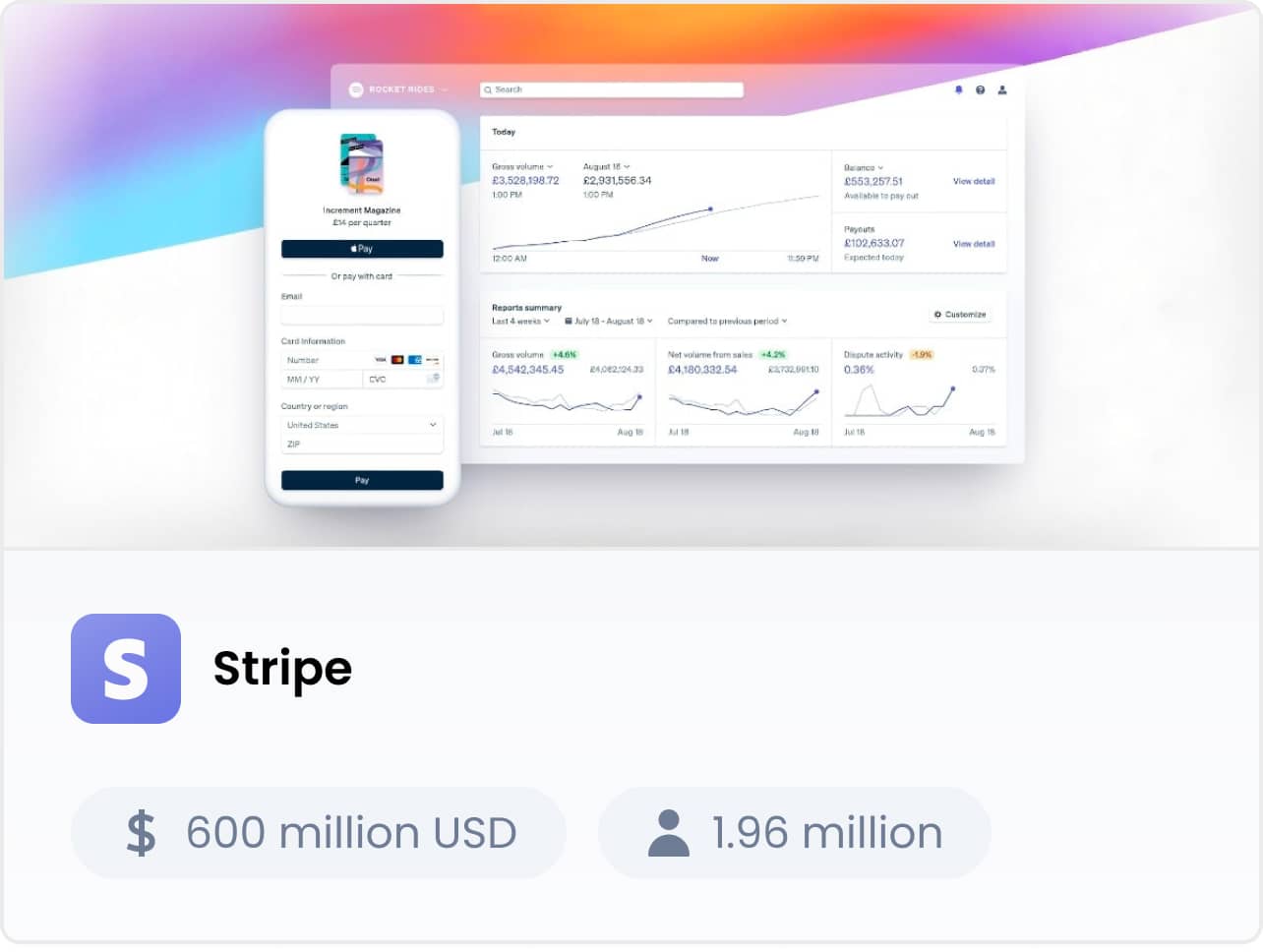
Funding: US$ 600 million
Users: 1.96 million
What they do: A king among Fintech companies, Stripe offers payment solutions for web-based marketplaces, subscription services, e-commerce businesses, and crowdfunding platforms. Millions of online businesses - from Pinterest and Kickstarter to Instacart and Squarespace - use it to structure their online billing processes.
One key fact to remember: The British Government uses Stripe to process payments for many of its departments.
2. Riskalyze
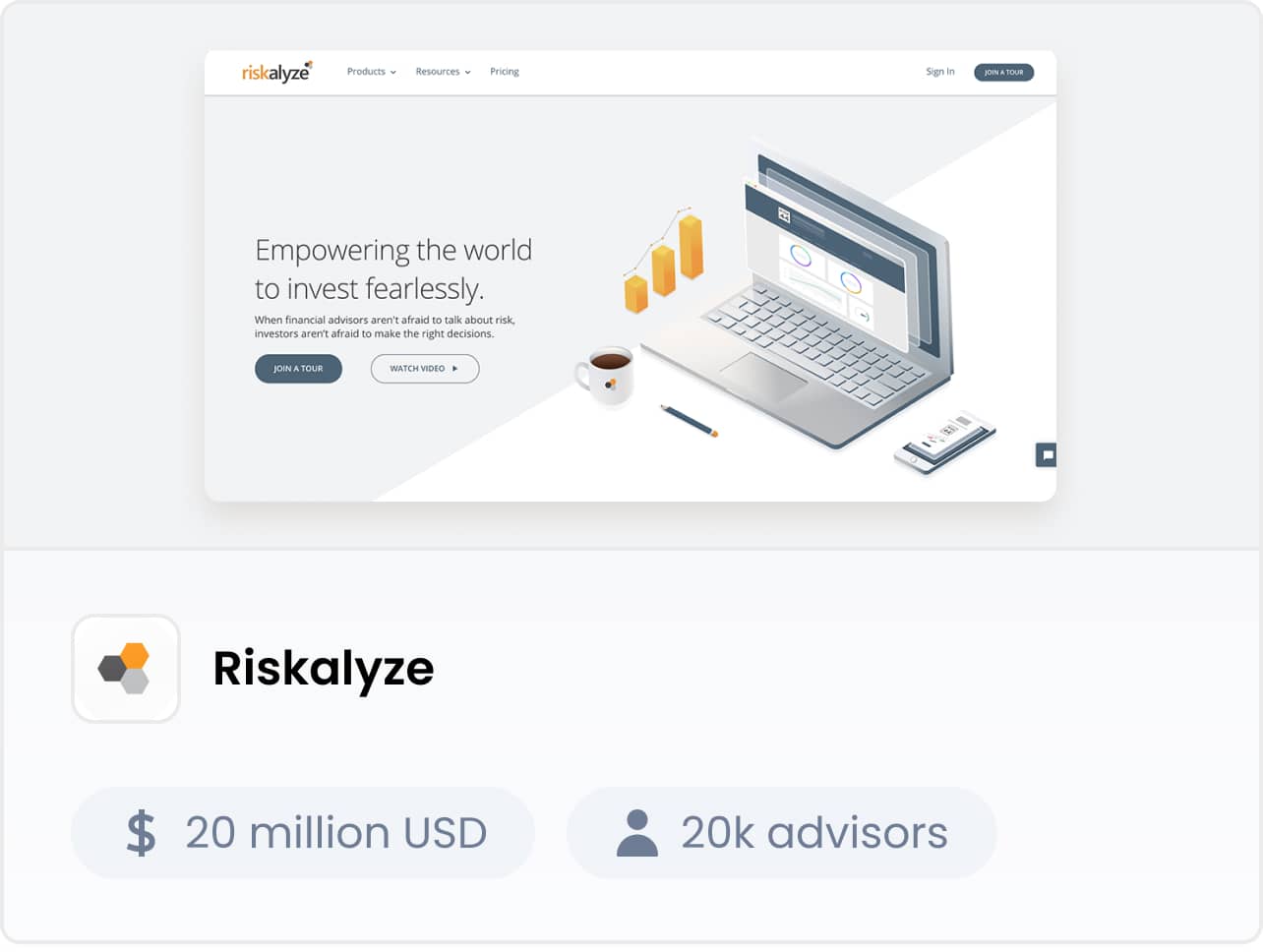
Funding: $20 million
Users: 20k advisors representing hundreds of billions in assets under management (as of August 2017)
What they do: Riskalyze delivers software as a service to financial advisors in the United States - among others, tools for analyzing investment risk, delivering 401(k) plans, and building investment portfolios.
One key fact to remember: Riskalyze was recognized by Fast Company as one of The World’s Top 10 Most Innovative Companies in Finance 2013 and The World’s Top 10 Most Innovative Companies in Personal Finance 2015.
Psst We've been working with Riskalyze since 2019. So, if you’re looking for a partner with whom you will build your next Fintech project - well, nice to meet you and let’s talk!
3. Sofi
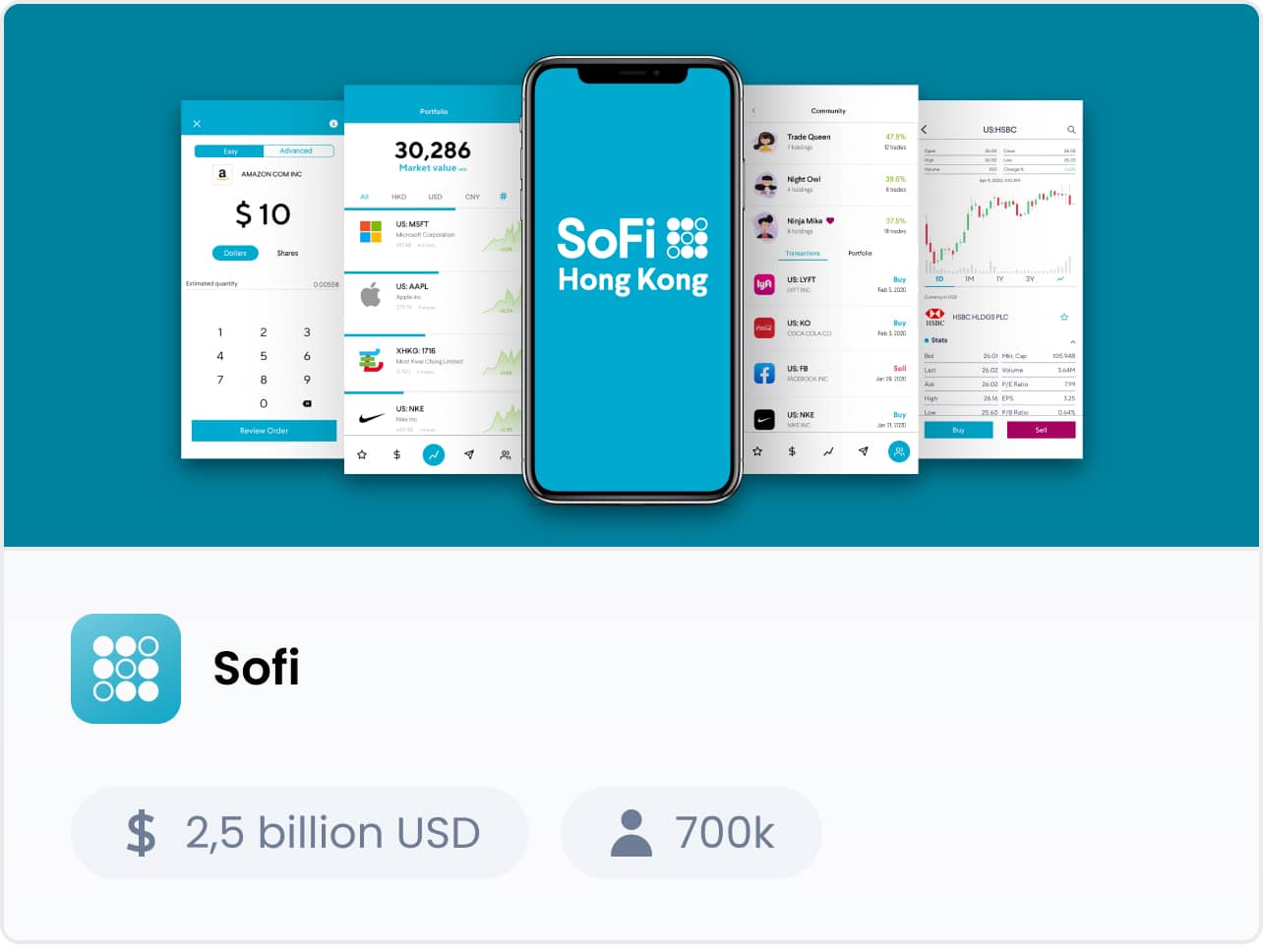
Funding: $2.5 Billion
Users: 700k members and 7.5+ million registered users
What they do: SoFi offers services such as refinancing, loans, and wealth management. They developed an algorithm for assessing a user's rates and the likelihood of loan repayment considering factors beyond income and credit history - like education, career, and estimated cash flow.
One key fact to remember: SoFi offers really cool benefits that most banks charge for or require large balances - for example, career services, unemployment protection, and financial advising.
4. Chime
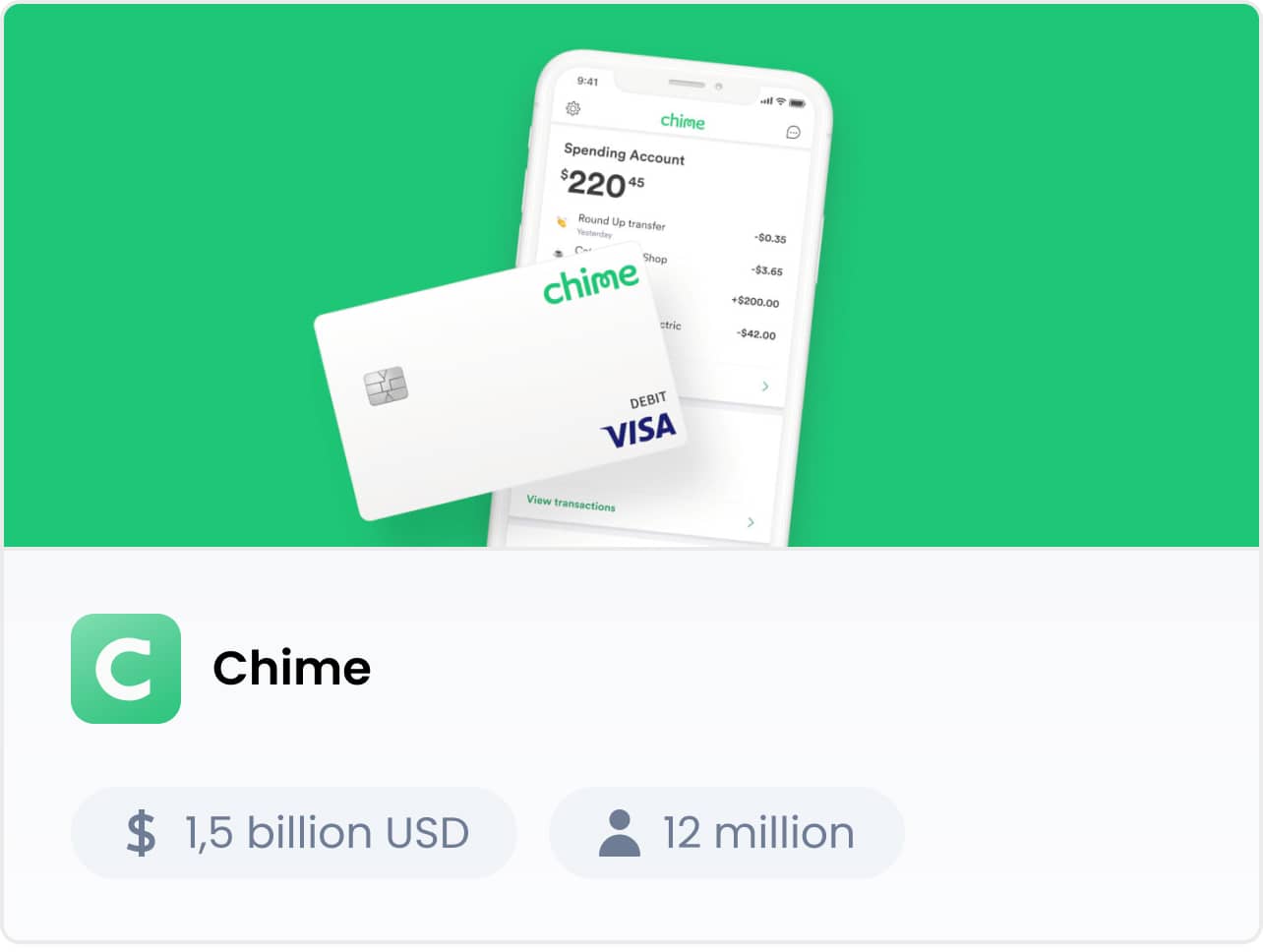
Funding: $1.5 Billion
Users: 12 million
What they do: Chime is a digital bank that promises excellent financial services without overdraft or maintenance bank fees. It offers a range of spending, savings, credit-building accounts, smart mobile banking, and digital payment solutions for individual users.
One key fact to remember: It’s hard to believe, but Chime doesn’t charge service fees. Instead, it relies on interchange transaction fees to merchants.
5. Robinhood
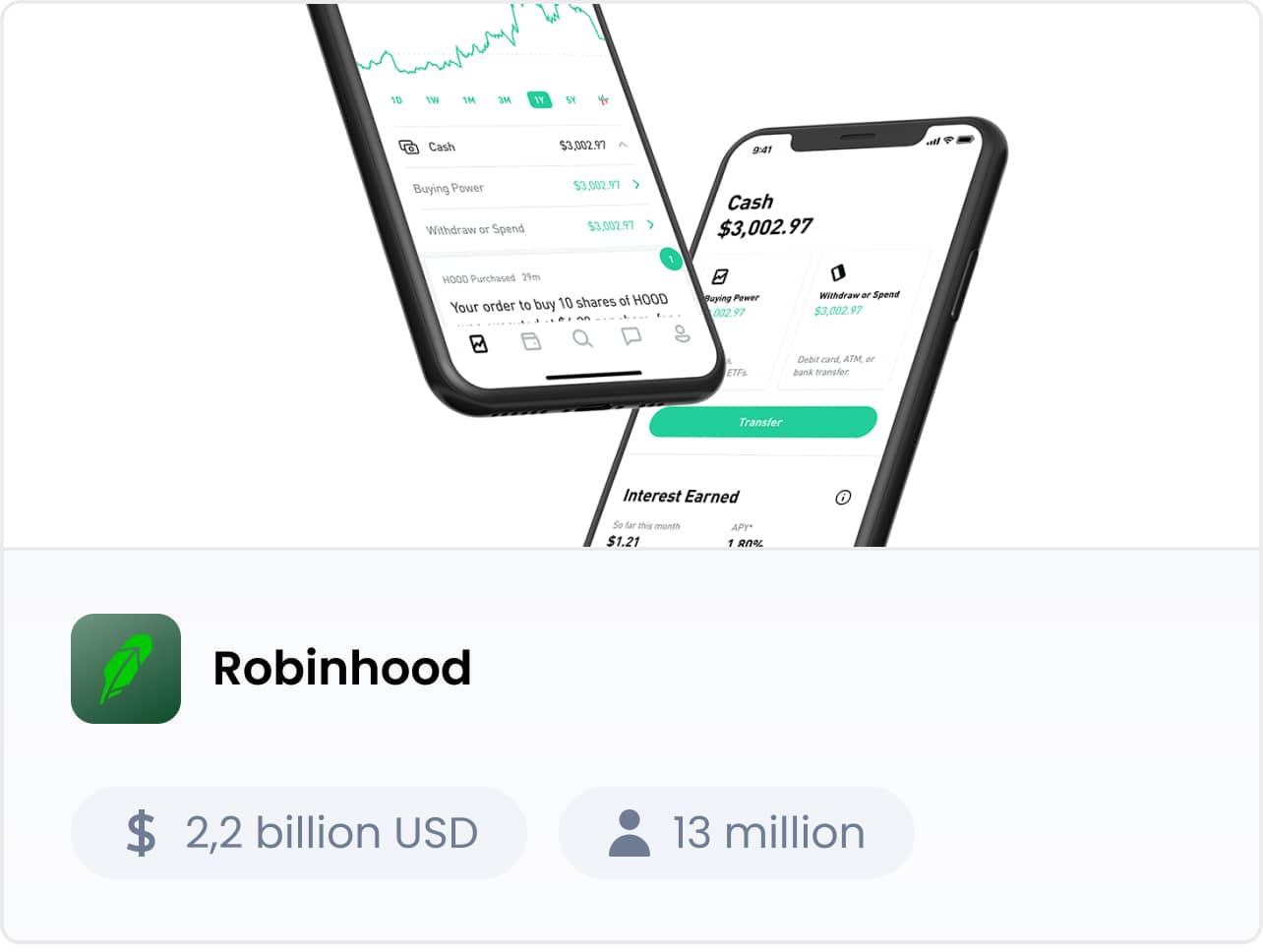
Funding: $2.2 billion
Users: 13 million
What they do: Robinhood is a world-famous stock brokering company that opens the doors to commission-free investing for individual users. The company’s web and mobile applications allow people to buy and sell stocks, ETFs, options, and cryptocurrencies without having to pay any fee.
One key fact to remember: Since it doesn’t charge any fees, the company’s revenue is based on the interest earned from balances and margin lending.
Stay updated
Get informed about the most interesting MasterBorn news.
6. Figure
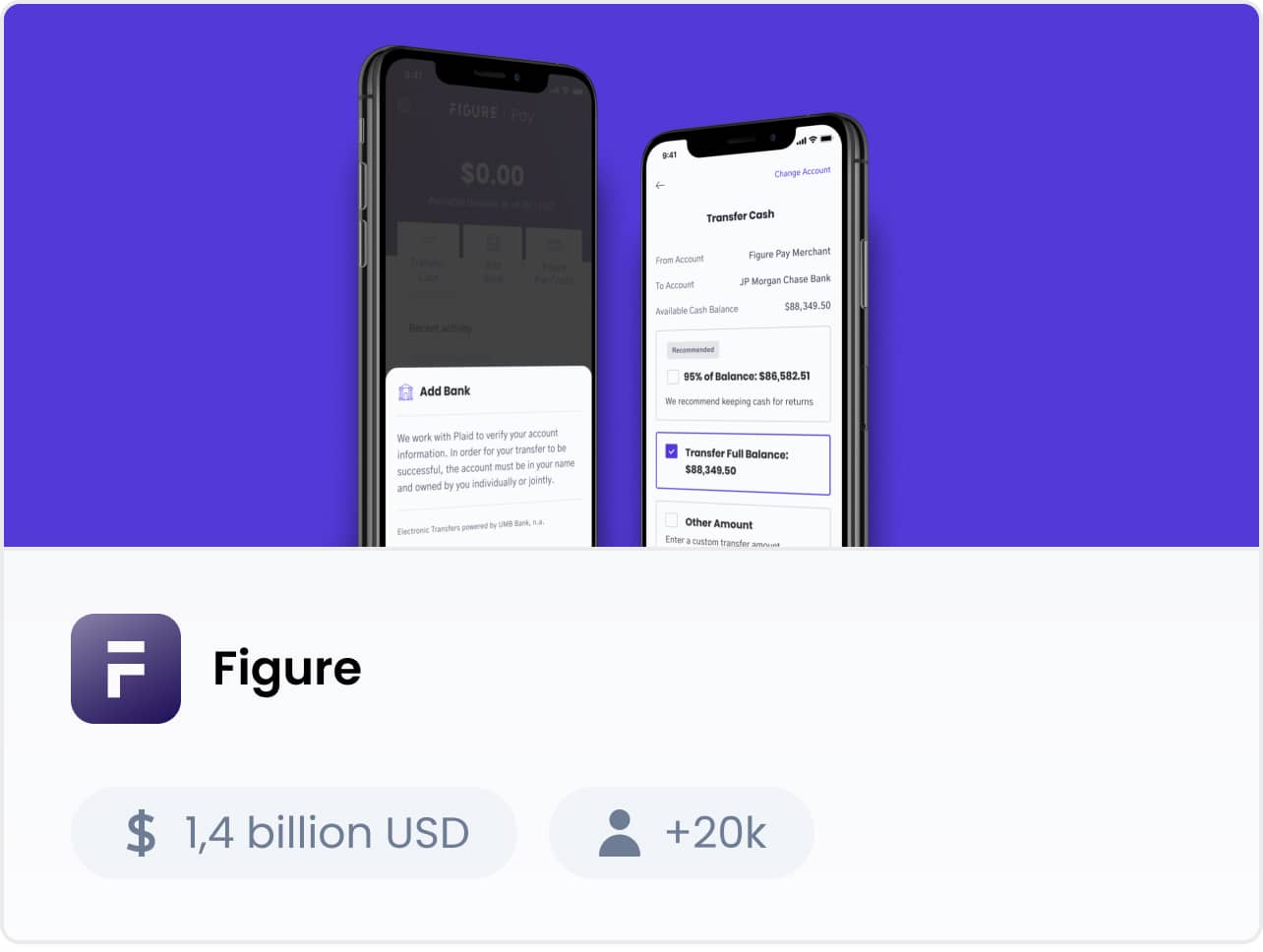
Funding: $1.4 billion
Users: 20+ thousand
What they do: Figure delivers a range of financial solutions dedicated to homeowners - from home equity lines and mortgage refinancing to investment opportunities. It’s power lies in low interest rates, product customization, and intuitive online applications.
1 key fact to remember: Figure uses blockchain technology.
7. Brex
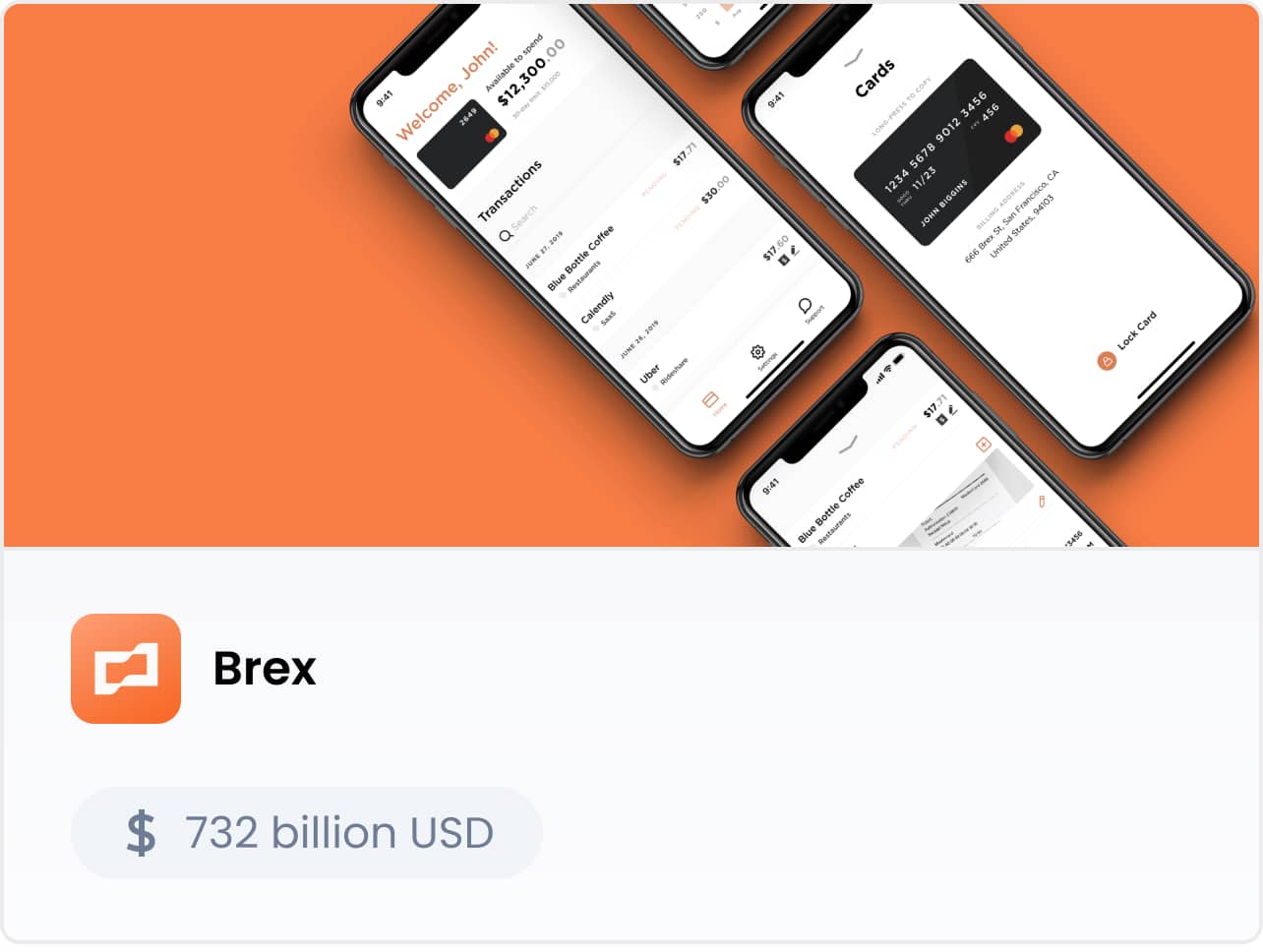
Funding: $732 million
Users: Y Combinator, Airbnb, Bounce, Carta
What they do: Brex is a well-funded Fintech startup that provides business credit cards and cash management accounts specifically to tech companies. The Brex financial platform allows these companies to manage their finances as they launch, scale, and grow.
One key fact to remember: The smart thing about Brex? It dissociates a startup’s finances from the founders’ personal assets and credit scores.
8. Tradeshift
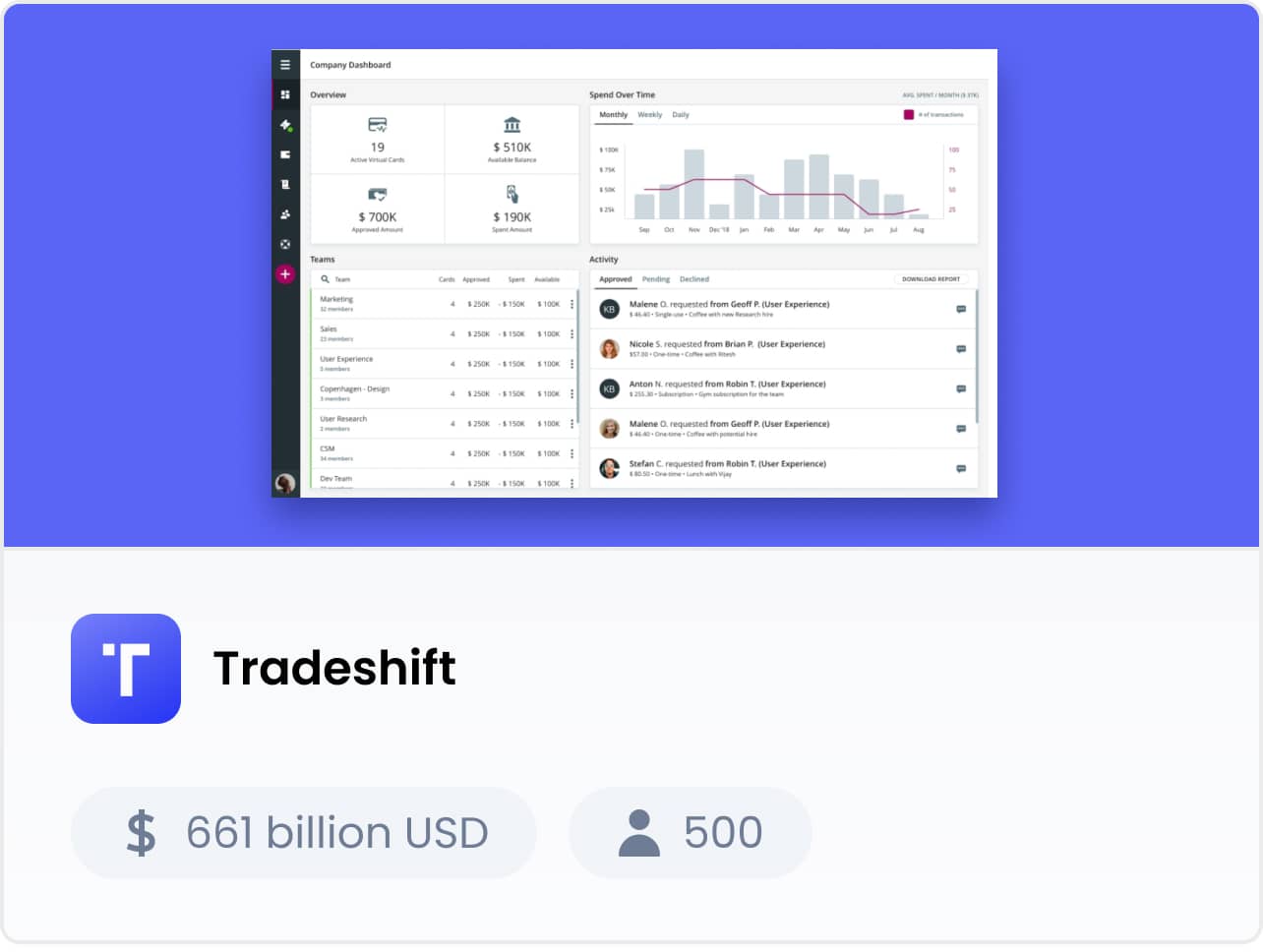
Total funding: $661 million
Users: 500 global customers
What they do: Tradeshift developed a B2B platform for handling supply chain management and payments. Companies of all sizes can easily connect with their suppliers, send electronic invoices, manage payments, and get products faster. Suppliers, on the other hand, can manage their orders, invoices, and cash flows better.
One key fact to remember: The company acquired the unicorn status after a round of funding in 2018 led by Goldman Sachs (raising $250 million at a valuation of $1.1 billion).
9. Next Insurance
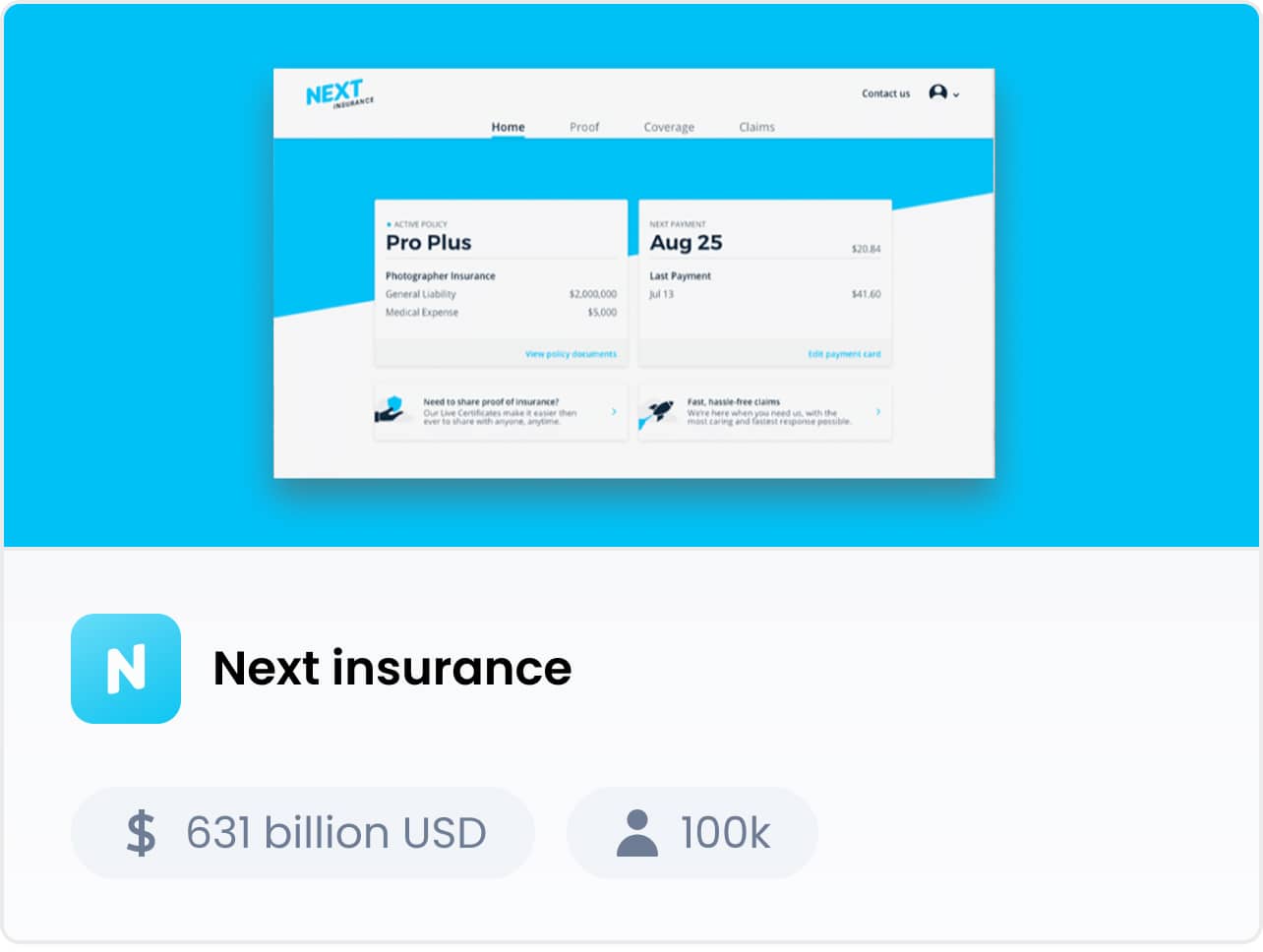
Funding: $631 million
Users: 100k
What they do: Next Insurance is an insurance provider for small businesses and entrepreneurs. Their technology allows this Fintech startup to eliminate agents or extras and offers accelerated claims management.
One key fact to remember: The company delivers tailored policies for thousands of professions, from fitness and dance instructors to child care and DJing.
10. Carta
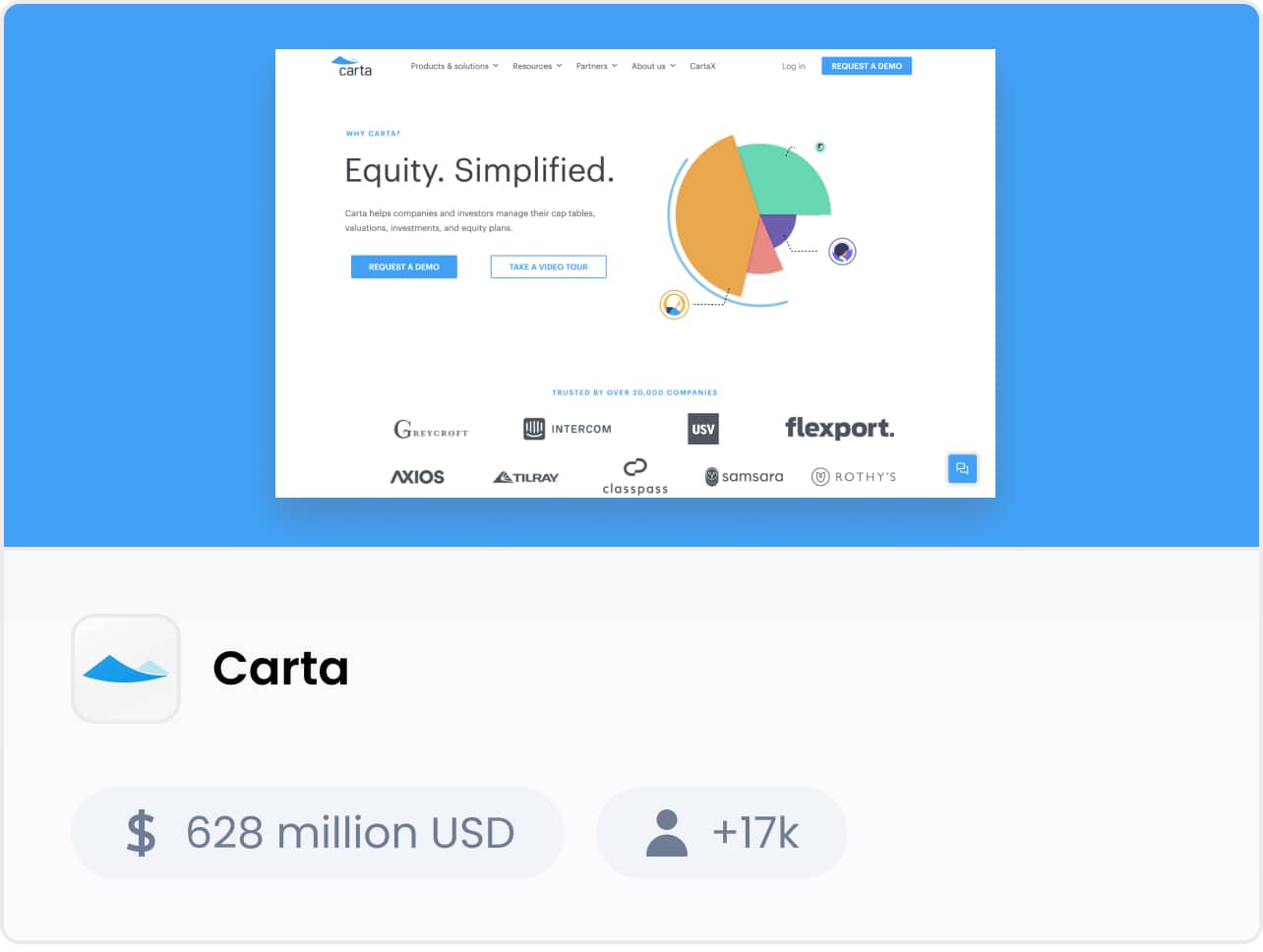
Funding: $628 million
Users: 17k+ companies
What they do:
Carta specializes in capitalization table management and valuation software, especially for seed-stage to pre-IPO startups. The platform allows founders, employees, and investors to easily manage equity - stocks, stock options, warrants, and derivatives in one place.
One key fact to remember: Users can see who owns what in the company in real time.
Bonus: 10 best-funded Fintech companies of 2020

According to worldbank.org - the Fintech market has reported rapid growth during COVID-19 with a predicted annual growth rate of 25% until 2022.
So now, as a small bonus - take a look at the list of the highest-funded startups of 2020. Fintech is the fastest-growing area dedicated to creating disruptive businesses and the below amounts of $ speaks for themselves:
1. Kabbage
Total funding: $2.5 billion
Kabbage provides small businesses with access to working capital by aggregating their data and calculating the required line of credit.
2. Avant
Total funding: $1.6 billion
Avant specializes in personal loans and uses Big Data and machine learning algorithms to provide a customized approach to credit.
3. Klarna
Total funding: $2.1 billion
Based in Stockholm, Klarna provides e-commerce payment solutions to merchants and shoppers like direct payments, pay after delivery options, and installment plans.
4. Judo Bank
Total funding: $1.5 billion
The Australian Judo Bank focuses on small and medium-sized companies to deliver tailor-made financial solutions.
5. Nubank
Total funding: $1.4 billion
The Brazilian Nubank provides a wide range of payment solutions, free-of-charge credit cards, and equity investment.
6. Prodigy Finance
Total funding: $1.3 billion
Prodigy Finance is a digital platform that specializes in providing loans to international postgraduate students and refinancing in the UK.
7. Wise (formerly TransferWise)
Total funding: $1.1 billion
Wise is a well-known international money transfer service that offers a great alternative to traditional (and costly) international money transfers.
8. Revolut
Total funding: $917 million
Revolut is a digital bank that offers several financial services through its comprehensive digital platform - from prepaid debit cards and currency exchange to peer-to-peer payments.
8. Toast
Total funding: $902 million
Toast specializes in point-of-sale as well as cloud-based restaurant management.
9. N26
Total funding: $783 million
N26 is a mobile banking platform that offers current accounts, fixed accounts, and other financial services to customers in the EU.
10. Jiedaibao
Total funding: $700 million
Jiedaibao is a Chinese marketplace for peer-to-peer lending.
Summary
We’ve had the pleasure to work with Riskalyze, mentioned above, for several years. That’s why our experts know how to create Fintech products from the inside out.
If you’re looking for developers who will build your MVP on the cheap, then... we can’t help you. But if you’re looking for an experienced partner that can advise you holistically - in the field of business, VC, product design, and software development - we’re here for you.
Table of Content
- What is Fintech?
- When was Fintech first used?
- 8 Fintech fun facts that will enrich your small talk
- 10 top Fintech companies based in California you should know
- 1. Stripe
- 2. Riskalyze
- 3. Sofi
- 4. Chime
- 5. Robinhood
- 6. Figure
- 7. Brex
- 8. Tradeshift
- 9. Next Insurance
- 10. Carta
- Bonus: 10 best-funded Fintech companies of 2020
- 1. Kabbage
- 2. Avant
- 3. Klarna
- 4. Judo Bank
- 5. Nubank
- 6. Prodigy Finance
- 7. Wise (formerly TransferWise)
- 8. Revolut
- 8. Toast
- 9. N26
- 10. Jiedaibao
- Summary
World-class React & Node.js experts
Related articles:
Top 8 Best Mental Health Apps and Startups Worth Checking Out
Discover the most impressive U.S.-based mental health apps and startups that are here to make a real difference. And good business too.
Front-end, Back-end, DevOps vs Full-stack: A Developers’ Guide for Founders and CEOs
The market demand for developers is growing. Plenty of companies are looking to hire a new developer for a project or their team. At the same time, the technology industry is becoming increasingly complex and developers are getting specialized in many disparate areas.
6 Tips on How NOT to Build a Minimum Viable Product – for CEOs and Founders
At MasterBorn, we are obsessed with improving the process of software development. For most companies and teams, this begins with creating and defining an MVP. We have built a lot of MVPs and I wanted to share some insights and best practices we have learned thus far, sometimes the hard way.